De Caro & Kaplen partner Michael V. Kaplen, a three-term president of the Brain Injury Association of New York State, and professorial lecturer at law, teaching a course in brain injury law at the George Washington University Law School, discusses the prevalence of TBI in America’s prison population, and echoes the CDC’s recommendations for new research to develop better methods for identifying inmates with a history of TBI, and for more support for those who are identified as having a brain injury while incarcerated.
Why does TBI in the Prison Population Need Attention?
- Studies cited by the CDC report anywhere between 25-87% of inmates have experienced head injuries or TBIs. Additionally, female inmates convicted of violent crimes and children/teenagers in the criminal justice system are more likely to have pre-crime TBIs or other forms of physical abuse.
- Prisons pose specific challenges for individuals with TBIs, which can complicate their period of incarceration, leading to issues such as difficulty following instructions, impaired memory, impulsive behavior, depression, anxiety, suicidal thoughts, and sensitivity to stimuli like bright light and loud noises.
Why is TBI screening necessary in the prison population?
- Prisoners may enter with TBIs from earlier injuries, and they can also experience brain injuries while incarcerated due to assaults and other factors. It is essential to screen all prisoners for traumatic brain injuries.
- Why is this important? Because prisons present many challenges for individuals with a brain injury which may further complicate their period of incarceration including:
- Failure to address and screen for TBI during incarceration can make reintegration into society more difficult and increase the likelihood of reoffending.
What steps are needed to address TBI and prisoners?
- Prison staff must be educated in recognizing and dealing with the deficits and symptoms of traumatic brain injuries.
- Prison staff must patiently repeat instructions for prisoners with a TBI.
- The root causes of anti-social behavior need to be considered and rehabilitation over punishment must be considered.
- Community re-entry programs and staff should also be trained to identify a history of TBI.
- Prisoners and staff must have access to consultation with professionals knowledgeable about traumatic brain injuries.
- Centers for Disease Control advice and recommendations for new research to develop better methods for identifying inmates with a history of TBI and related problems, and for determining how many incarcerated individuals are brain injury survivors needs to be heeded.
About The Author
Michael V. Kaplen represents victims of vehicle collisions, unsafe buildings and construction sites, and medical malpractice, and is a preferred attorney of The Brain Injury Association of America.
Michael is board certified as a Civil Trial Advocate and board certified in medical malpractice litigation. He is a Professorial Lecturer in Law, The George Washington University Law School, The Legal Aspects of Traumatic Brain Injury.
Michael is past chairman of the American Association for Justice (AAJ) Automobile, Highway and Premise Liability Section, past chairman of the AAJ Traumatic Brain Injury Litigation Group, three term president of the Brain Injury Association of New York State served two terms as chair of the New York State Traumatic Brain Injury Services Coordinating Council and vice-president, New York State Academy of Trial Lawyers.
He was invited by President Obama to participate in the White House Healthy Kids & Safe Sports Concussion Summit.
He is admitted to courts in New York, Florida, and Washington, DC. He has been selected as a New York Super Lawyer and recognized by Best Lawyers of America and U.S. News and World Report in personal injury law.
